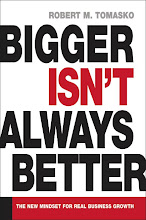February 14, 2006
The bronze medal effect
People who create real growth, rather than just free-riding on rising commodity prices (Feb 7 post), know how to look for opportunities, build support for seizing them, and then use momentum to move things forward. The Olympics provide some insight into the momentum generation part of all this.
Momentum comes from creating a series of small successes. But where does the first early win come from? By focusing time and resources growers find a way to accomplish something, however small, in the direction in which they want to move. Growers know that motivation does not precede action, but it comes from it. So the basic idea behind generating momentum is simple: do something, something easy if possible, but still likely to advance your cause from wherever it is now. This serves to prime the pump and motivate more action, which in turn further ratchets additional motivation.
The idea of initial “small successes” is important. Ironically, limited early success may be more useful for motivational purposes than an initial bigger win. Call it the “bronze medal effect.” Studies of Olympic game winners find that bronze medalists tend to be happier about their victory than those winning the silver (see James Shepperd and James McNulty, “The Affective Consequences of Expected and Unexpected Outcomes,” Psychological Science, Jan. 2002, p. 85.).
Olympians, like the rest of us, tend to compare what occurred with what might have been. For bronze winners, the most likely alternative is getting no medal, while most silver medalists focus more on having lost the gold than on their victory over the bronze holders. It is possible to be objectively better off than others, but feel worse about it - our minds work in strange ways. Expectation management is an important part of momentum creation.
Small wins are also safer. They are visible enough to establish an idea’s viability, but not so large as to arouse jealousy, or threaten already well-established activities. A string of small victories at the outset of a growth initiative can be more useful than one lucky big win. Bronze can trump gold.
Momentum comes from creating a series of small successes. But where does the first early win come from? By focusing time and resources growers find a way to accomplish something, however small, in the direction in which they want to move. Growers know that motivation does not precede action, but it comes from it. So the basic idea behind generating momentum is simple: do something, something easy if possible, but still likely to advance your cause from wherever it is now. This serves to prime the pump and motivate more action, which in turn further ratchets additional motivation.
The idea of initial “small successes” is important. Ironically, limited early success may be more useful for motivational purposes than an initial bigger win. Call it the “bronze medal effect.” Studies of Olympic game winners find that bronze medalists tend to be happier about their victory than those winning the silver (see James Shepperd and James McNulty, “The Affective Consequences of Expected and Unexpected Outcomes,” Psychological Science, Jan. 2002, p. 85.).
Olympians, like the rest of us, tend to compare what occurred with what might have been. For bronze winners, the most likely alternative is getting no medal, while most silver medalists focus more on having lost the gold than on their victory over the bronze holders. It is possible to be objectively better off than others, but feel worse about it - our minds work in strange ways. Expectation management is an important part of momentum creation.
Small wins are also safer. They are visible enough to establish an idea’s viability, but not so large as to arouse jealousy, or threaten already well-established activities. A string of small victories at the outset of a growth initiative can be more useful than one lucky big win. Bronze can trump gold.
